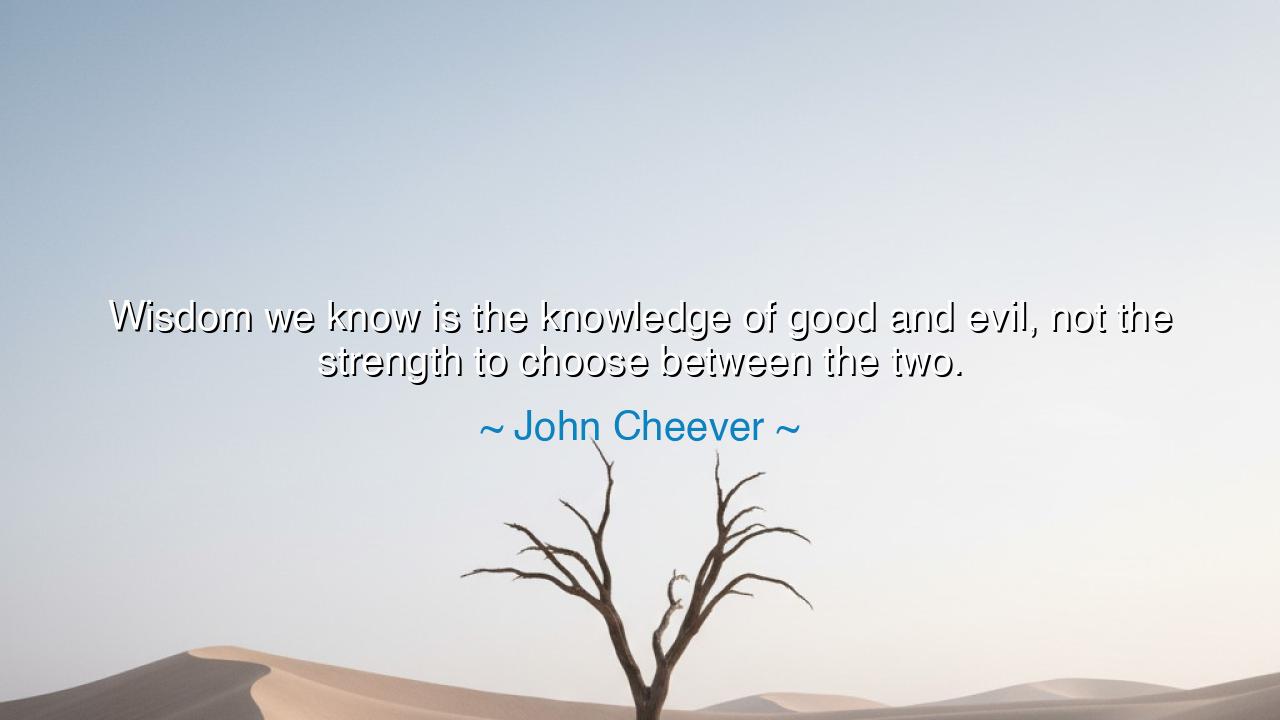
Wisdom we know is the knowledge of good and evil, not the
Wisdom we know is the knowledge of good and evil, not the strength to choose between the two.






In the solemn and reflective words of John Cheever, the great American storyteller of the human soul, we encounter a truth as old as Eden itself: “Wisdom, we know, is the knowledge of good and evil, not the strength to choose between the two.” In this simple sentence, Cheever captures the eternal divide between knowing and doing — between understanding the nature of right and wrong, and possessing the courage to walk the righteous path. It is a confession of the human condition: that we may see the light, yet still wander in shadow; that awareness alone does not save us, for knowledge without virtue is like a lantern in the hands of the blind.
The origin of Cheever’s words lies in his lifelong meditation on morality, temptation, and the struggle of conscience. His stories, often set in the glittering suburbs of mid-century America, revealed the quiet wars of ordinary souls — people who knew what was right, yet faltered before the lure of comfort, pride, or desire. Through this lens, Cheever spoke not only of his generation but of all humanity. Like the philosophers of old, he understood that wisdom is not triumph over evil, but the awareness of its existence — and that this awareness, while sacred, is often painful.
From the beginning of time, humankind has been burdened by this knowledge. In the Book of Genesis, it is the Tree of the Knowledge of Good and Evil that marks the dawn of moral awareness. Adam and Eve, by tasting its fruit, gained the power to discern good from evil — but not the strength to resist what they now understood. They became wise, yet broken; enlightened, yet exiled. Thus was born the tragedy of man: that we may know what is good, but lack the strength to follow it unwaveringly. Cheever’s words breathe new life into this ancient story, reminding us that wisdom alone cannot redeem us — only the will to act upon it can.
Consider, too, the example of Socrates, who spent his life teaching the pursuit of virtue through reason. He believed that knowledge of the good would naturally lead to good actions. Yet history and human experience have proven otherwise. Many have known the right path and turned away from it — kings, generals, thinkers, even prophets. Knowledge shines upon the mind, but temptation whispers to the heart. And often, the heart is stronger. Cheever’s observation pierces through the illusion of intellectual pride: that to be wise is not to be moral, and that true greatness requires not only the mind’s clarity but the soul’s discipline.
There is something deeply humbling in this truth. To know good and evil is the beginning of wisdom, but not its fulfillment. One may understand justice and still act unjustly; one may speak of compassion and still be cruel. The saints and sages of old learned that wisdom is not an end, but a mirror — it reflects our moral landscape, revealing both light and shadow. It shows us what we are capable of, but it cannot move our hands or still our appetites. For that, one needs strength, which is born not from knowledge, but from character, faith, and practice.
Cheever’s words, though rooted in modern prose, carry the cadence of ancient philosophy — a warning against the arrogance of intellect. In an age where knowledge expands endlessly, humanity must remember that enlightenment without empathy leads to ruin. The builders of empires, the makers of machines, the scholars of power — all may be rich in wisdom, yet poor in virtue. It is not enough to know the moral law; one must live it. The true sage is not he who defines good and evil, but he who chooses the good, even when the evil offers ease.
So, my children of the future, let this be your teaching: seek wisdom, but do not stop at knowing. Let knowledge awaken your conscience, but let discipline shape your deeds. Each day you will face the choice between light and shadow; do not imagine that seeing them clearly will make the decision easier. Train your heart as you train your mind. Build strength from humility, courage from compassion, and action from understanding. For wisdom without will is the voice of the wind — it whispers truths that vanish into silence. But wisdom joined with strength becomes the voice of the ages — a song that endures, guiding those who walk the narrow path of righteousness.






AAdministratorAdministrator
Welcome, honored guests. Please leave a comment, we will respond soon